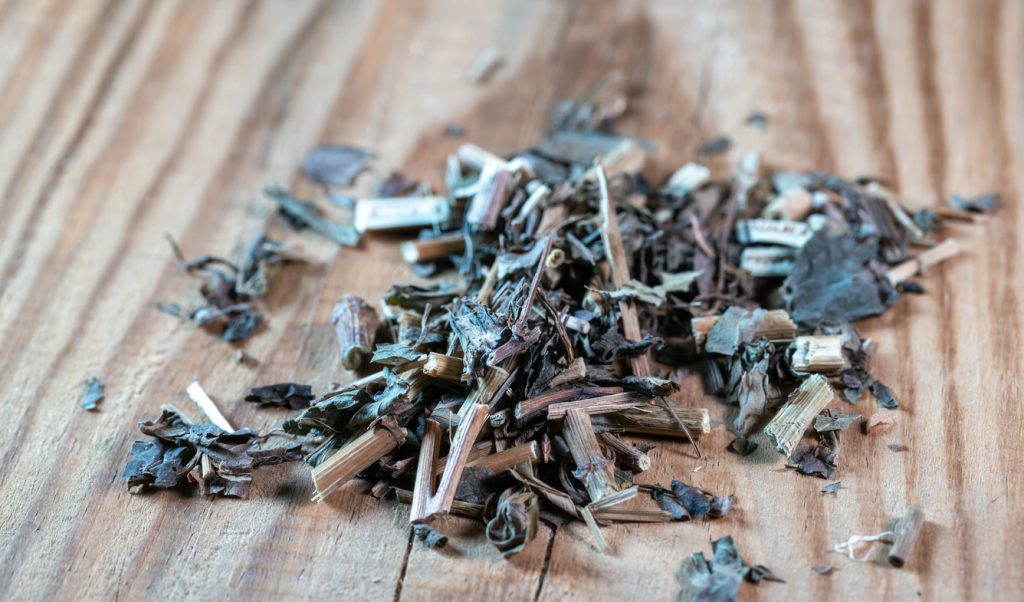Eupatorium Fortunei (Pei Lan Herb)

What is Eupatorium Fortunei (Pei Lan Herb)?
Fortune Eupatorium Herb (pei lan, 佩兰), also known as Eupatorium Fortunei, is a bush-like plant that bears large clusters of flowers. Since ancient times, Eupatorium Fortunei has appeared in Chinese and Japanese literature for centuries. In ancient China, Eupatorium Fortunei was referred to as Lan Cao (兰草). In Japan, this plant was known as fujibakama, a term that was also applied to cultivated Eupatorium Flowers which have noticeable differences from the wild Eupatorium Fortunei.
A herbaceous perennial that grows up to 100 cm in height, Eupatorium Fortunei grows upright with green stems that are often tinted with reddish or purple dots.
This plant grows in many parts of the world, such as South America, Mexico, China, Japan and Korea. Eupatorium Fortunei is also frequently grown in home gardens as a decorative plant.
While Eupatorium Fortunei can grow in both shaded and sunny areas, it requires moist soil to thrive. The aerial parts of this plant, such as its flowers, leaves and stems, are often used in herbal remedies. The Pei Lan Herb is usually harvested in Summer and Fall, then cut into slices and dried under the Sun before medicinal usage.
In Traditional Chinese Medicine (TCM), the Pei Lan Herb falls under the category of ‘Aromatic herbs that transform Dampness’. Such herbs can resolve Cold-Damp Stagnation, especially in the stomach and the Spleen. Neutral in nature, this herb does not affect the yin-yang balance in the body.
Pungent in taste, Eupatorium Fortunei can promote the circulations of qi and body fluids. In particular, the Pei Lan herb targets the Spleen, the Lungs and the stomach.
Functions and Benefits of Eupatorium Fortunei (Pei Lan Herb)
Traditional Chinese Medicine (TCM) shows that Eupatorium Fortunei has the following health benefits.
Eupatorium Fortunei can resolve Dampness to relieve syndromes caused by Damp obstruction in the middle energizer. For example, the Pei Lan Herb can relieve poor appetite, nausea and stifling sensations in the chest.
As the herb can aromatically dispel Middle Jiao turbid filth to address the internal accumulation of increasingly thickened dampness in the Middle Jiao, the Pei Lan Herb can cure Damp-Heat in the Spleen that is manifested as symptoms such as sweetness and greasiness in the mouth, plenty of saliva, bad breath, halitosis, lethargy, fatigue, anorexia, epigastric and abdominal distention and pain as well. It is also suggested that Eupatorium Fortunei can help to correct imbalances associated with celiac disease, an autoimmune condition in which gluten consumption triggers damage to the small intestines.
Eupatorium Fortunei can also dispel Summer-Heat to release the exterior and resolve Damp-turbidity from the interior. This makes the Pei Lan Herb a great herb to relieve symptoms such as fever, headache, chest fullness and greasy tongue coating.

How to Use Eupatorium Fortunei (Pei Lan Herb)
Eupatorium Fortunei is most commonly available as part of a decoction. Some herbal shops and Asian markets sell fresh and dried Eupatorium Fortunei, either raw or in supplement forms such as pill and powder.
The recommended daily dosage of Eupatorium Fortunei is 5 – 10g, when taken as part of a decoction or powder. When you are using fresh Eupatorium Fortunei, the recommended dosage is usually doubled.
Eupatorium Fortunei can be consumed to treat digestive disorders such as diarrhoea, heartburn, flatulence and indigestion. For external usage, the aerial parts of the Pei Lan herb can be soaked in oil and applied to the scalp to treat dandruff.
Cautions and Side Effects of Eupatorium Fortunei (Pei Lan Herb)
Eupatorium Fortunei contains the essential oil thymol. Research has shown that large doses of thymol can cause side effects such as stomach irritation, headaches, vertigo, circulatory problems and respiratory problems.
Individuals who are experiencing Yin Deficiency or Qi Deficiency, especially Qi Deficiency in the stomach, should avoid consuming this herb.
As of this writing, there are no known drug interactions with Eupatorium Fortunei.
However, we strongly recommend you to consult your healthcare provider before deciding to add the Pei Lan Herb to your healthcare routine!
Summary
Here is a summary for Eupatorium Fortunei (Pei Lan Herb):
- Herb name (Chinese): 佩兰
- Herb name (Pin Yin): pèi lán
- Herb name (English): Fortune Eupatorium Herb
- Herb name (Botanical): Herba Eupatorii
- Origin of species: Eupatorium fortunei Turcz.
- Part(s) of herb used: Plant parts above ground
- Geo-specific habitat(s): Jiangsu, Zhejiang, Hebei
- Taste(s) & Properties: Pungent; Neutral; Administrates the Spleen, Stomach and Lung Meridians
- Actions: Improves appetite; Helps to remove bad breath; Relieves symptoms associated with heat stroke
References
Choi, J. G., Lee, H., Hwang, Y. H., Lee, J. S., Cho, W. K., & Ma, J. Y. (2017). Eupatorium fortunei and its components increase antiviral immune responses against RNA viruses. Frontiers in pharmacology, 8, 511. [Accessed on 16th December 2022]
Pham, T. N., Pham, H. D., Dang, D. K., Duong, T. T., Le, T. P. Q., Nguyen, Q. D., & Nguyen Tien, D. (2019). Anticyanobacterial phenolic constituents from the aerial parts of Eupatorium fortunei Turcz. Natural product research, 33(9), 1345-1348. [Accessed on 16th December 2022]
Tori, M., Ohara, Y., Nakashima, K., & Sono, M. (2001). Thymol Derivatives from Eupatorium f ortunei. Journal of natural products, 64(8), 1048-1051. [Accessed on 16th December 2022]
Share this article on
